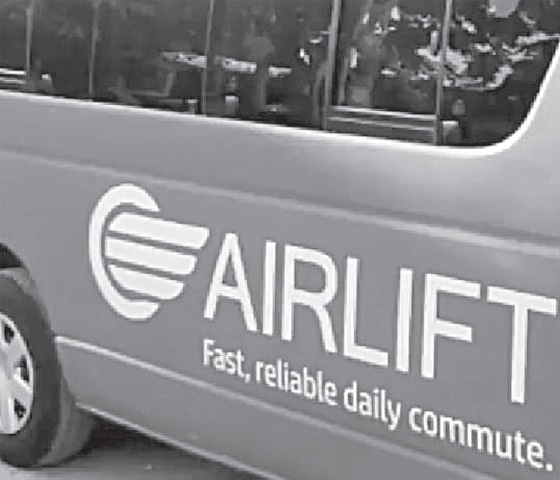
Commuting is one of the most nightmarish things in Pakistani cities.
Congested roads, impatient drivers, potholes and the absolute lack of affordable and reliable means of transportation are some of the reasons why.
With minibuses at the lowest end that give you migraine to driving your car that not only puts a heavy dent in the pocket but also gives you anger issues, this is a vicious cycle.
But there’s a new startup in town that’s trying to make your intracity travelling easier and cheaper, one ride at a time.
Airlift is a smart bus service that offers stop-to-stop public transport services on selected routes across Lahore and Karachi.
Similar to the good old coaches and buses, but instead of first-come-first-serve basis, the booking has to be done online beforehand.
The process is quite simple: download the app, register with contact details, search for routes and book your ride at least a day before (and up to three). Money can be paid through the in-app wallet and you can buy packages ranging between Rs1,000 and Rs5,000 using your credit/debit card.
You can also live-track the location of the booked vehicle and get on board at the chosen pickup point.
They currently have an undisclosed fleet of 13-seater Hiaces and 21-seater buses, all air-conditioned, with around 150 routes across the two cities.
As for their supply, they have a rented fleet consisting of both full-time drivers and a part-time Uber-style network with both paid on a per-ride basis.
Meanwhile, the startup generates revenues from customers through Rs50 earned per seat booked (or more appropriately the packages bought).
The idea for Airlift came to Chief Executive Usman Gul when he was visiting Lahore for vacations and was bothered by the congestion caused by the inefficiency of local transportation means such as rickshaws.
“I realised how so many people going towards the same direction pay for full fares themselves rather than pooling a ride and found a problem to be solved here,” he recalls.
Gul, along with five other partners, founded Airlift, using $50,000 pooled in by himself and family and the startup was officially launched in March this year.
Gul is looking at the upper middle class urban neighbourhoods of Gulberg, Johar Town etc where the population is tech savvy and has access to smartphones and bank cards.
But that’s not all. There is another segment he is targeting: women. “Our local transportation infrastructure is quite unfriendly to women and many have to stay back home just because of this issue. So Airlift is trying to attract them and in fact around half of our users are women,” Gul informs.
Within the local ecosystem, transport and ride-hailing has perhaps been the most active sector thanks to the success stories of Careem, and the growth of Bykea.
The two startups, along with Uber, have practically changed the way commutation is imagined in urban centres, especially with the massive growth in their bike business.
So how does a new player, with a completely different model, hope to make its place?
“We are operating in different markets than them so while Bykea/Careem bike would be more popular among the blue collar workers, our solution would be preferred by a banker making Rs200,000 a month,” says Usman Gul, adding “most of our customers actually have their own cars but they want to do away with the hassle of driving daily to work or other routine places or leave the vehicle home for family use etc.”
And given the substantially higher fares in car-hailing, it wouldn’t be fair to compare Airlift to them.
Since the launch, the startup has reportedly raised $2.1 million from a number of angel investors across Pakistan, Singapore and the US. And now, Gul is eyeing at another million, this time from venture capitals, to fuel Airlift’s growth.
“This will go towards funding our operations, especially adding more routes in the two cities, as well as improving tech infrastructure,” the CEO says.
In an increasingly tech-based economy that aims to simplify things and bring everything to the consumer’s doorstep, isn’t a stop-to-stop transportation service going in the opposite direction? Or more inconvenience at least?
“That’s not the perspective of our customers who are happily willing to walk to a pickup/drop-off point for paying lower rates.
Plus our stop network is very strategically situated in convenient locations so it’s never much of a commute to and from the home anyway,” he claims.
The fact that this model has been implemented elsewhere too, particularly in the developing world, puts weight behind his claims. For example, Egypt’s Swvl, a similar bus service startup offering fixed rates and bookings through smartphones, has already raised over $80m in the past two years while India’s Shuttl with some $48m in funding is trying to grab the office commutation market in metropolises.
In Gul’s own words, he wants to ‘create a mass transit system’ in Pakistan that works efficiently and is cheap which he feels is missing. But is that really something a private enterprise can do, or more appropriately, should? That’s a debate we’ll take up some other time.
The writer is member of staff:
m.mutaherkhan@gmail.com
Twitter: @MutaherKhan
Published in Dawn, July 21st, 2019















































